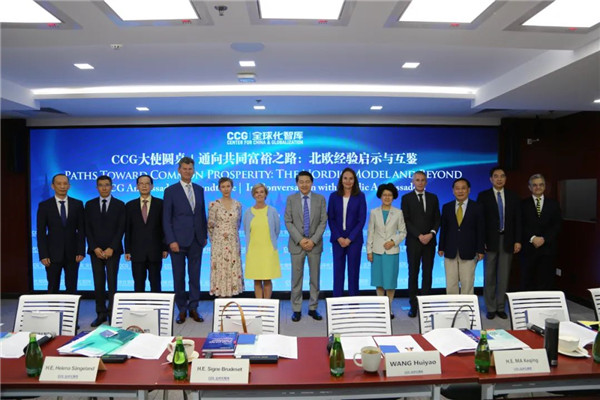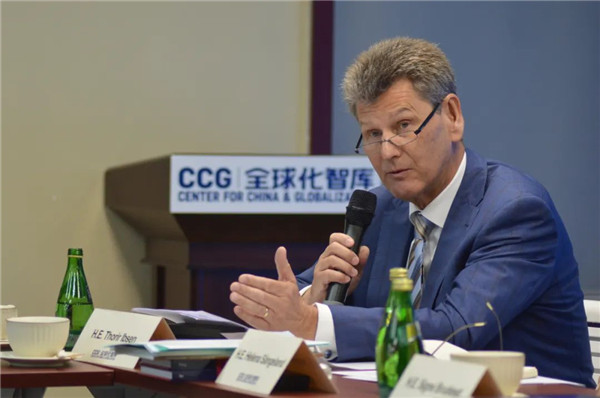H.E. Thorir Ibsen Speaks at CCG Ambassadors’ Roundtable
In an era of globalization, countries everywhere face daunting socioeconomic challenges. Inequality is rising. Cohesion is weakening as societies undergo identity crises. As governments in search of role models for governance, equality, and social and economic policy, the so-called Nordic model often ranks the top. Practiced in Nordic countries, including Sweden, Norway, Denmark, Finland, and Iceland, the Nordic model is characterized by a state welfare system, access to quality education, and low income disparities, which contributes to the countries’ continued growth and prosperity.
China shares the Nordic countries’ drive to combine market economy and government intervention. As the country seeks to transform its economy and address challenges due to unfettered growth in the past decades, the Nordic experiences may shed light on possible pathways toward the national goal of common prosperity. This event provides highly contextualized accounts of the Nordic model and a discussion about its relevant applications for the future.

At the Center for China and Globalization (CCG) the Ambassadors of the five Nordic countries, Denmark, Finland, Iceland, Norway and Sweden presented different aspects of Nordic governance and practices, including fiscal policy, education, parental leaves, demographic policy, resource management and sustainability, and exchanged views with Chinese scholars and officials on how China can learn and build on Nordic experiences and practices as it works to meet its national goal of common prosperity.
Presentation by Presentation by H.E. Thorir Ibsen, Ambassador of Iceland to China

I will devote my presentation to two observations.
Firstly, a general observation about the Nordic approach, and secondly a more specific observation about Iceland’s experience of sustainability.
As for the general observation, the Nordics are pragmatic. We avoid using strong words in our analysis of state-of-affairs. We believe that dramatized language is not helpful and in fact can be dangerous as it can encourage reactions and solutions that are neither useful nor peaceful.
Thus, instead of drawing up a dramatic picture of the challenges that the world community is facing, we approach these challenges in a pragmatic and analytical manner with a view to solving the problems.
As a Nordic, I thus take issue with such broad stroke generalization that we are living an era of crises.
We are certainly facing important challenges and changes. But we are not facing crisis, and certainly not multitude of crises. Our institutions, society and economy have not become dysfunctional. – And neither our societies nor the world order are at the brink of collapsing or being transformed into a new social or world order.
On the contrary, we have, at least in the Nordic countries and in Europe, efficient democratic governance that constantly address income disparity and other socioeconomic challenges through fiscal policy, the education system, health care and the welfare system.
We like diversity and we have a long-standing democratic tradition, institutions and independent media that foster cohesion through free and transparent political discussion.
We have decades of experience of resolving environmental problems. — And we lead international cooperation to protect the environment and promote sustainable development.
And our security architecture, especially NATO has proven to be one of the most cohesive, capable and committed collective defensive alliance in the world. It safeguards our way of life, our freedoms, and our security. This has been especially important since Russia’s brutal and illegal invasion of Ukraine and war of aggression.
Turning to Iceland, and our experience of sustainability.
Iceland is an affluent, dynamic and democratic island country. We enjoy one of the highest living standards in the world, and as a Nordic country, Iceland has an egalitarian society, characterised by social inclusion, economic fairness and gender equality.
We built our affluence by adopting an open export-oriented market economy, and by developing the use of our natural resources into successful competitive export industries.
Relying as we do on our natural resources, we have learned the importance of protecting our environment and using our natural resources sustainably.
With sustainable resource management, we secure a more stable economy and long-term economic growth, as well as more equal distribution of economic rewards and social benefits.
Moreover, by focusing on sustainability, we unleashed innovation and growth of green practices and low carbon technologies that have brought Icelandic companies to the global market and indeed to China.
However, transforming the economy to sustainability is often easier said than done.
In our experience, for sustainable policy to be successful it must have a broad support among businesses and citizens alike. It must be justifiable and based on reason. And the policy and its implementation must be clear and transparent.
In other words, both businesses and citizens must understand the need for the policy, see their interest in implementing the policy, and be able to trust that its application is equitable, inclusive and just.
Thus, the policy must bring win-win for businesses and people as well as for the environment.
The regulatory framework must encourage sustainable business practices including through economic rewards. And the social and economic needs of communities must be met with secure employment.
Businesses and people must have ownership of the policy. That is, policies and measures must be developed with direct involvement of representatives of the relevant interest groups and stake-holders, and be subject to public consultations.
The policy must be justifiable and based on reason. Thus, the environmental measures and decisions related to the management of natural resource must be based on the best available scientific knowledge.
The policy and its implementation must be clear and transparent. Citizens and businesses must be able to see and verify that the sustainable policy is working and applied in a just and equitable manner. Number of tools secure such transparency, including:
·Publicly available environmental data.
·Peer reviewed environmental performance reviews of government policies.
·Corporate environmental disclosure.
·Reliable labelling for consumers, including eco-labels. And
·Environmental Impact Assessment of projects.
To conclude with a few key-words that we can discuss. Sustainability:
·requires independent and peer-reviewed science,
·it has to be economically efficient and beneficial,
·it has to be socially equitable and just,
·it must involve ownership and direct participation of all stakeholders (citizens, businesses and interest groups), and
·it must be transparent to ensure trust.





